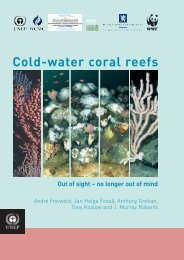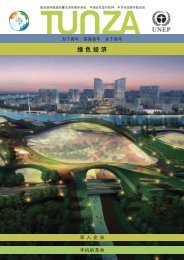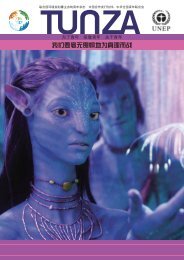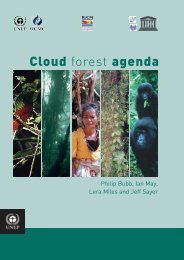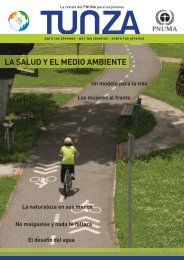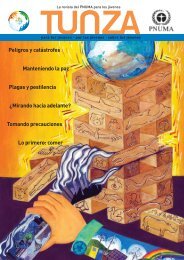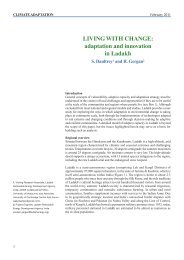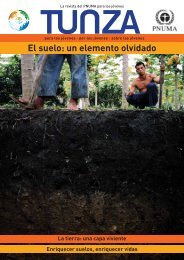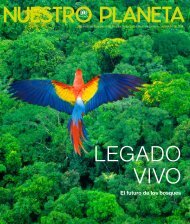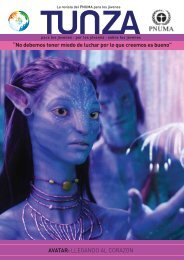BIODIVERSITY - Our Planet
BIODIVERSITY - Our Planet
BIODIVERSITY - Our Planet
You also want an ePaper? Increase the reach of your titles
YUMPU automatically turns print PDFs into web optimized ePapers that Google loves.
It’s safe to say that when you say the<br />
word “Africa” to most people, the<br />
images that appear in their minds<br />
are something like Botswana.<br />
They will picture waterways alive<br />
with blazing-pink flamingos, lazy<br />
hippos, ferocious crocodiles and<br />
millions of other birds, insects,<br />
plants and fish; baking savannah<br />
where herds of elephants rest under<br />
shady trees and lions, cheetah and<br />
wild dogs stalk nimble antelope<br />
and zebra; a place where the<br />
extraordinary is normal and where,<br />
for millennia, people have been<br />
learning the secrets of plants and<br />
animals that surround them.<br />
Biodiversity is not something that<br />
we merely think about in Botswana<br />
— it is something that defines our<br />
nation and our people, something<br />
that gives us our traditions and our<br />
history, and a fundamental part of<br />
our economy.<br />
The biological diversity of Botswana<br />
— which includes us, its people — is<br />
the beating heart of our nation, and<br />
our deep-rooted understanding of<br />
this is part of what makes Botswana<br />
an African success story. We respect<br />
and care for our resources, and our<br />
desire to sustain and maintain the<br />
environment that has nurtured us<br />
all helps to inform our wider set of<br />
sustainable policies. This means that<br />
we do not allow rapacious exploitation<br />
of our land and its resources and this<br />
has helped us to create a healthy<br />
economy, a peaceful and effective<br />
democracy, good standards of living<br />
and a stable society.<br />
Protection of our biodiversity is<br />
not some vague cause that we pay<br />
lip service to — it is our patriotic<br />
duty and our duty to our children.<br />
In protecting our biodiversity, we<br />
protect the very essence of Botswana<br />
and its people. Indeed, the use of<br />
biological resources in Botswana is<br />
as ancient as human antiquity.<br />
The health of a country’s biodiversity<br />
is often an indicator of the health of<br />
its society. To maintain biological<br />
diversity one needs good governance<br />
and a holistic and long-term vision<br />
for the nation. In Botswana this is<br />
what we endeavour to do, and as a<br />
result of our pragmatic approach —<br />
and unlike many developing nations<br />
with an abundance of mineral<br />
wealth — we have not fallen prey to<br />
the so called “resource curse” where<br />
potential wealth generates unrest,<br />
inequality, poverty and suffering.<br />
Instead, our diamonds and other<br />
minerals — which are, of course, a<br />
finite resource — have assisted us<br />
in setting in place policies that will<br />
help us to continue to thrive even if<br />
the revenue from mining diminishes.<br />
These polices, naturally, have<br />
the protection of our natural and<br />
renewable assets — our biological<br />
diversity — at their heart.<br />
Tourism is an important and<br />
growing part of our national income<br />
— accounting directly or indirectly<br />
for 10 per cent of our GDP — and<br />
this depends on ensuring that<br />
Botswana remains beautiful and<br />
exciting, which means conserving<br />
our stunning wildlife. Agriculture<br />
OUR PLANET OUR LIFE<br />
7



